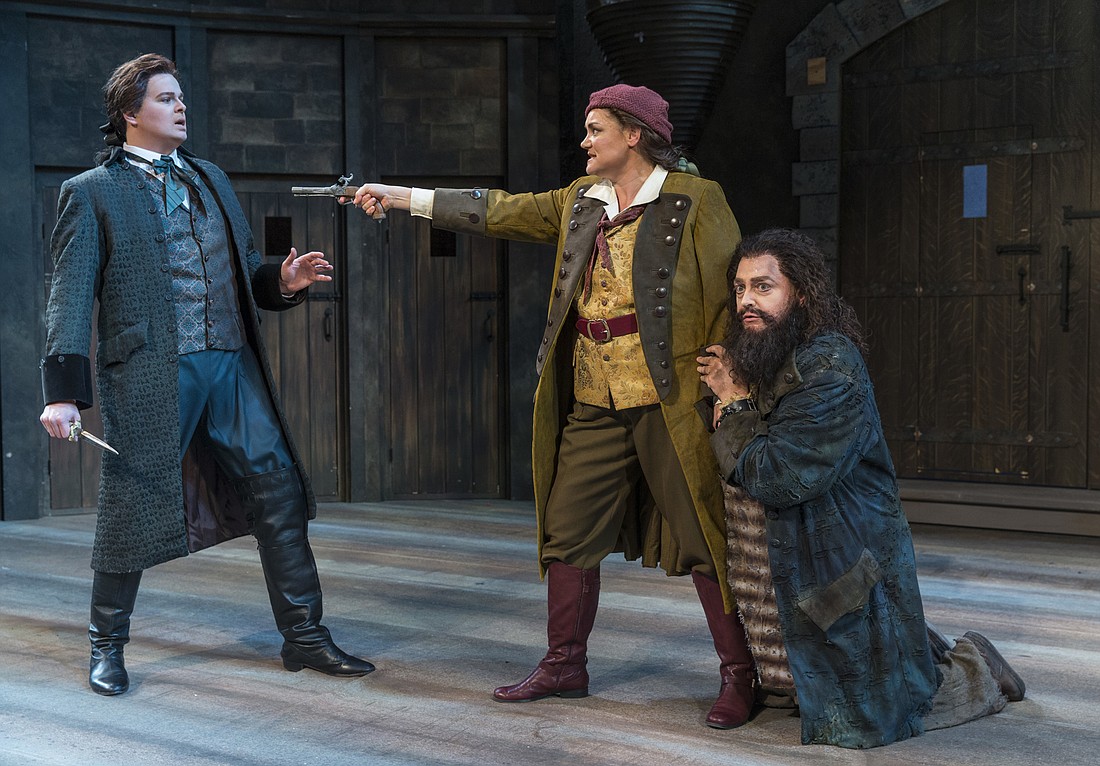- April 22, 2024
-
-
Loading

Loading

America’s most Italian of opera houses was transformed into a real Beethovenhalle this past weekend when Sarasota Opera presented a spot-on production of “Fidelio,” the master’s only completed opera.
Ekhart Wycik, who made his Sarasota Opera debut last season with Rimsky Korsakov’s “The Golden Cockerel,” is obviously much more at home with Beethoven, and the orchestra, chorus and singers were in the best of hands as they performed with a skillful grasp of Beethoven’s Germanic style.
It’s rare that an American company incorporates more than Beethoven’s “Fidelio” Overture into the performance, even though the composer wrote three “Leonora” Overtures before deciding his fourth, titled “Fidelio,” was the one with which he wanted to open his opera. Many European houses use the great “Leonora” Overture No. 3 between the first and second scenes of the second act, and that’s exactly what Wycik decided to do in this production. Their towering performance added a buzz of excitement that made the grand finale, with a happy ending, positively stunning — emotionally, visibly, vocally and certainly, orchestrally.
There was grand singing from the Sarasota Opera Chorus men and women throughout the opera. But what made this the truly grand opera that it is, were the soloists who, with few exceptions, had impeccable German diction (thanks to diction coach Bobby Garibaldi-Sanders). Like Mozart’s “Magic Flute,” there is considerable dialogue in “Fidelio,” and it needs the proper accent and inflection.
Above all, the singing was thrilling and soaring in almost every case, starting with Marzelline, the young girl infatuated with the disguised Leonore, whom she thinks is the brashly heroic young man, Fidelio. As Marzelline, Studio Artist Vanessa Isiguen displayed a large, lyrical soprano that easily soared over the orchestra and chorus, while she wove her way into our hearts.
Kara Shay Thomson’s Leonore/Fidelio was positively heroic, vocally and dramatically. She had just the right amount of swagger as a boy with the strength of a grand dame-of-a-woman as she saved her imprisoned husband from death. A true feminist Walkyrie, her first act aria, “Abscheulicher,” (“Abominable One”), was powerful and electrifying but then, so was everything she sang and acted. I thought she was great here as “Tosca,” but she got so into the skin of Leonora, I have to wonder if she’s not headed toward a major German career.
Sean Anderson was stronger as Don Pizarro, the evil governor of the state prison, than I’ve seen or heard him in other roles. He was properly pompous and so believable one wanted to boo, rather than cheer, as he came out for his well-deserved curtain calls.
Both Don Fernando (Jeffrey Beruan) and Rocco (Harold Wilson), were strong, convincing characters with voices to match. And the gatekeeper, Jaquino (Studio Artist Christopher Trapani), showed authentic emotions along with a good, solid voice, as he tried to woo Marzelline. Andrew Surrena and Hans Tashjian, the first and second prisoners, were admirable, dramatically and vocally.
Michael Robert Hendrick as Florestan, the prisoner and husband of Leonora, had some strong moments of acting and singing but he often let the passion of his plight run away with him, particularly in his second act aria, “Gott! Welch Dunkel hier,” (God, how dark it is in here), where he forced his voice and pushed his pitch way above the tone. Florestan is a bear of a part. He doesn’t make his appearance until the second act and then it’s to sing one of the biggest, most difficult of arias written for a tenor. Hendrick was dramatically excellent but let the drama get in the way of his musical performance.
Interestingly, the only caveat I have about this production is that the fervor of the story – good triumphing over evil – got the better of the singers and they almost ran away with some tempos, especially in the great final chorus, "Wer ein holdes Weib errungen,” which almost flew out of Wycik’s control.
Still, this was a “Fidelio” that was so true to style and composer, it could have been done in concert form but the staging by Director Tom Diamond was riveting. Michael Schweikardt’s scenery, taking us from courtyard to dungeon to parade grounds was imaginative, while Ken Yunker’s lighting let us seen into the subterranean depths of the dungeon and feel its damp, cold walls and scurrying rats. Roger Bingaman gets special acclaim for the wondrous chorus.
If you think German opera is stilted or heavy-handed, you need to see this “Fidelio.” You’ll become a convert.